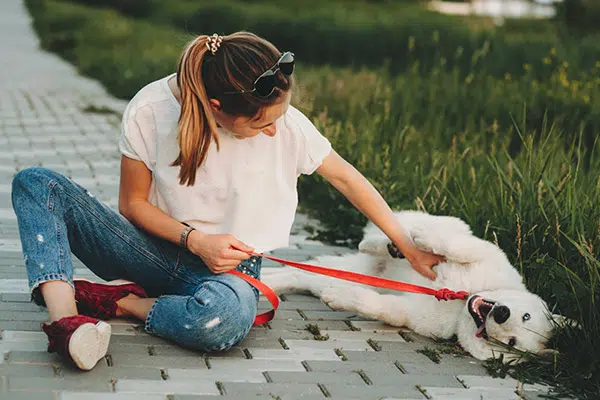Dogs crave our love, attention, and acceptance and few things in their lives make them happier than when they are getting pets and scratches from their favorite humans.
One thing that almost all canines have in common, though, is that they are very likely to kick their legs when you find a good spot and scratch away.
While this might look just like silliness or our dog enjoying the superior belly scratches we are giving them, in fact, there is a very good reason why our dogs react this way when we scratch them.
So why do dogs do this and what does it mean?
There is actually a very simple and scientific reason why dogs kick their legs when they are being scratched.
Dogs have a scratch reflex and it is activated when you give them scratches on certain parts of their body.
The area that we tend to scratch that activates the kicking of our pups, is commonly known as the “saddle region.”
Our dogs’ saddle region encompasses their belly, flanks and back.
When we scratch this area, it’s actually “irritating” the dog, and that is what causes them to kick one or sometimes both legs when we scratch their bellies.
This reflex is the same when you scratch them as it might be if they were to get bit by an insect of some kind.
This isn’t necessarily an actual irritation, as in annoyance though, many dogs absolutely love getting their bellies scratched.
This is just their bodies having a reflex in reaction to our scratching.
However, there are some dogs that do not enjoy being scratched in this area of their bodies.
Therefore, it’s really important to gauge your dogs’ body language and demeanor when you are scratching their bellies to make sure they do actually enjoy it and aren’t just letting their owner do something to them that they aren’t particularly fond of.
Signs To Watch For With Your Dog
If your dog does any of the following actions when you are scratching its belly, it is a good sign that it might be uncomfortable and may not be enjoying itself.
If you notice these cues, you might want to give your dog a break from belly scratches:
- Trying to move away from you
- Trying to roll onto its stomach instead of its back
- Tensing up their muscles
- Closing their mouths tightly
- Pinning their ears back
- Yelping, growling or making other unhappy sounds
However, if they do these actions, the odds are excellent that your pup is very much enjoying its belly rubs and you should feel free to continue:
- Rolling over onto their backs and showing you their belly
- Letting their tongue fall out of their mouth
- Making happy sounds
- Appearing relaxed and content
If your dog has itchy skin or skin allergies, they may seem to enjoy these scratches, but it might not be very good for them.
You could be irritating their skin by scratching them, so always make sure to pay attention to the appearance of your pups as well as their body language.
Final Word
Keep in mind, this scratch reflex is completely involuntary for the dog.
The dog has no control over how much they kick, the speed at which they kick, or even which leg does the kicking.
It’s not something they can prevent themselves from doing.
The dog’s body is telling it to try to satisfy the itch you are providing with the belly scratches, even though there is no reason for them to scratch their own itch.
Believe it or not, the scratch reflex isn’t just a quirk that our dogs have, it can actually serve a very important purpose for our dogs.
The scratch reflex is also actually a great diagnostic tool for veterinarians in some instances.
If a veterinarian suspects that your dog may have some kind of nerve damage or neurological issue, they can test your pooch’s reflexes and response by trying to trigger this leg kick.
This test can help veterinarians know if there is an issue that needs to be further investigated.
Now that the mystery of why dogs kick their legs when being scratched is solved, use it to build an even stronger bond with your dog.

